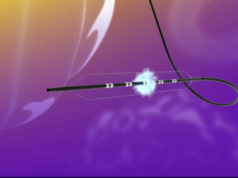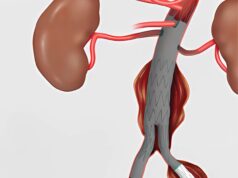Vascular surgeons have split over the SVS initiative supported by the American Board of Surgery (ABS) to apply for a Primary Certificate in Vascular Surgery. Meanwhile vascular surgery became a full specialty in Europe at the October UEMS (European Union of Medical Specialists) Management Council Meeting in Lisbon, Portugal.
Some like Frank Veith see primary certification as a kind of Trojan horse. “Although this development might look good to vascular surgeons seeking any improvement in our training paradigms,” said Frank Veith, Chairman of the American Board of Vascular Surgery (ABVS), he described the proposal to apply for a Primary Certificate in Vascular Surgery “under the auspices (and total control) of the ABS” as the latest “clever way for the ABS to derail us yet again with an apparent victory.” “Most who are clear thinking believe that only an independent board of vascular surgery will do the trick,” emphasized Veith.However, the SVS Annual Meeting in Anaheim last June saw Dick Green call for a united front and support for primary certification in his presidential address. In July, Jack Cronenwett resigned as a Director of the ABVS and in his resignation letter to Frank Veith, Chairman of the ABVS, Dr Cronenwett described a primary certification as “critical to our ability to attract future applicants into vascular fellowships” and emphasized that the application for an independent Board for vascular surgery as “an iterative process”. Dr Cronenwett added that his “resignation represents a vote of no confidence in the current leadership of the ABVS, not a lack of support for the overall mission.”
Dr Veith has consistently argued for primary board status for vascular surgery as “a clinical imperative for our patients”. He outlined both the case for an independent board and why it has not happened in giving the first Henry Haimovici Distinguished Lecture at the 26th World Congress of the ISCVS and the inaugural Meeting of the International Society of Vascular Specialists in Maui, Hawaii last March. “…Vascular surgery has evolved and grown to become a complex and distinct specialty which provides care for all vascular disorders outside the head and heart” and that “results in vascular surgery are better if the care is provided by those who specialize in it…On this basis vascular surgery should be its own separate specialty with its own independent Board recognized by the American Board of Medical Specialties (ABMS)…The existence of an ABMS approved ABVS would provide benefits other than improved patient care. One such benefit is that it would make it more difficult for other physicians to provide vascular disease care as an offshoot or sideline of the main theme of their specialty. Another benefit is that it would establish vascular surgery as a clearly defined specialty in the minds of patients and referring physicians. It would also facilitate the establishment of consistent high standards of patient care and the public and professional education needed to support these standards. It would enable us to train adequate numbers of vascular surgeons to care for the increased number of vascular patients as the baby boomers pass into their golden years. And an approved ABVS would prevent general surgeons poorly trained in vascular disease from testifying against vascular surgeons in malpractice cases. In the light of all these benefits, it is clear that vascular surgery should have its own independent Board and RRC in Vascular Surgery. It is obvious and has been recognized and defensible for decades. With the introduction of endovascular techniques and other skill sets that require additional specialized training, having such a Board and RRC in vascular surgery becomes even more of a ‘no brainer’.”
In the lecture Dr Veith pointed to three groups as being responsible for why an independent Board of Vascular Surgery does not exist. “First is the American Board of Surgery or ABS which has campaigned openly and loudly to keep vascular surgery a subordinate subspecialty. The second group is the ABMS. The ponderous structure and incestuous nature of the cartel-like ABMS have made its default response to any progressive change “No”. This negativism and the influence of the ABS with other member Boards within the ABMS have enabled the ABS to promote its own vested interests even though they are in violation of the stated goals of the ABMS.
“The third group is a small number of true vascular surgeons who have been persuaded to join the ABS opposition to an independent Board of Vascular Surgery. Although other terms could be used to describe these individuals, the term “general surgery oriented vascular surgeons” might be best. Some of these collaborators are senior and influential vascular surgeons who sit on the Councils or hold office in national or regional vascular surgical societies. One can only speculate about the motives of these individuals. Some may honestly believe that the effort to obtain an independent ABVS is unattainable and cooperation with the ABS may make the situation for vascular surgery less intolerable. Others may not recognize the evolutionary changes that have occurred in vascular surgery. These resistance-to-change individuals reason that because the system worked 20 years ago, it is good enough for the present and the future. Other collaborators may be seduced by an opportunity to be appointed to the ABS Board of Directors and the honor and prestige that position brings. Still others may be influenced by their desire to obtain a more powerful position within the hierarchy of general surgery, either locally or nationally.”
In his profile in the September edition of Vascular News, Dick Green gave his perspective on the issue of vascular surgery becoming an independent specialty. “I have been a supporter of independence [for vascular surgery],” said Green, “but I don’t believe that it is a panacea for all that ails us.”
According to Green, “We have a finite amount of time to train physicians and we cannot afford to spend the majority of time training them to do procedures that they will never do. We have to take away [time] from the general surgery training to increase experiences in interventional training and imaging training – all the things that vascular surgeons should know about.”
In the past American Board of Medical Specialties (ABMS) rules made a separate board the only way to achieve this redistribution and de-emphasis on general surgery. This past year the American Board of Surgery (ABS) has entertained and approved a recommendation from the SVS that would no longer require complete general surgery training for someone wishing only to practice vascular surgery. By issuing two co-equal certificates – one in vascular surgery and the other in general surgery – it would be possible to do everything we need to in the domain of training and certification.
“I think that is a home run for vascular surgeons,” said Green. “While some are concerned that this is likely an interim step, I think it is the step we must be taking right now. I am hopeful that vascular surgeons can provide a united front and support the efforts to get this done.”
However, according to Green, there are groups that will oppose this endeavor. “The radiologists have and will oppose this. They have notified the American Board of Medical Specialties that they are in opposition to the proposal for primary certification. They are reliving all the old battles and that is unfortunate. The American Academy of Neurology, in support of the neurovascular interventionalists, opposes it although we have not heard from the Board of Neurology yet. It appears that the American Board of Internal Medicine will not oppose us and I am encouraged by that. There are efforts underway to negotiate with the American Board of Radiology but I am not terribly optimistic that they will bear fruit.”
Dr Green then explained why he sees the primary certification for vascular surgery through the ABS as preferential to an independent board for vascular surgery at this moment in time. “Let’s say the ABMS has an epiphany and decides that vascular surgery should be independent. Vascular surgeons will become responsible, like neurosurgery and like orthopedic surgery, for the entire five-years of training. I don’t feel we are ready to take on that responsibility. Some of our programs have only three faculty [members]. How are three faculty going to train residents for five years? We need willing partners. I would rather have a partner that I am really a partner with opposed to someone that I have no affiliation with and ask that group to give me cases. So I want to make general surgeons our partners in this training effort. I think we have a better chance, and in the meantime we can build our infrastructure and get faculties that are larger. Currently, there are only a handful of programs in the country right now with large and diverse enough faculties to do this alone.
Meanwhile vascular surgery has became a full specialty in Europe at the October UEMS (European Union of Medical Specialists) Management Council Meeting in Lisbon after a vote carried the necessary two-thirds majority for the creation of an independent Section and Board of Vascular Surgery. Fabrizio Benedetti-Valentini, President of the Division of Vascular Surgery in the UEMS wrote to Roger Greenhalgh, President of the UEMS European Board of Surgery, in March saying that the Division and Board of Vascular Surgery had “reached general agreement” to proceed to request Section status for Vascular Surgery. Roger Greenhalgh then reported this to the next meeting of the European Board of Surgery and Section of Surgery with Andr̩ Nevelsteen representing the interests of Vascular Surgery and Greenhalgh in the Chair. At that meeting many of the surgeons argued that vascular surgery had all that it required already including a full European Board of Vascular Surgery. Nevertheless, Nevelsteen argued to the Section of Surgery that Vascular Surgery had reached a point where it would be helpful for vascular surgery to be recognised as a Section and with it the status of a specialty. This was for all sorts of reasons but particularly because in the future there would be special needs of training for vascular surgery requiring catheter skills as well as open vascular surgical skills. Therefore it would be necessary to reduce some of the less urgent aspects of training and create a meaningful curriculum and move towards producing a hybrid surgeon with catheter skills in the future. Opposition from the Section of Surgery to vascular surgery as a separate specialty was even more evident at the September Warsaw meeting with Michael Polonius in the Chair of the Section of Surgery as the new Section president who spoke against vascular separation at the UEMS Management Council meeting in Lisbon.
In order that surgery does not lose its voice, there is enthusiasm to create a ‘Federation of Surgery’ should be created between various Sections of Surgery within the UEMS in the form of a voluntary network in Europe.
In the US vascular surgeons appear to be at loggerheads whilst in Europe they can now celebrate their independence.












